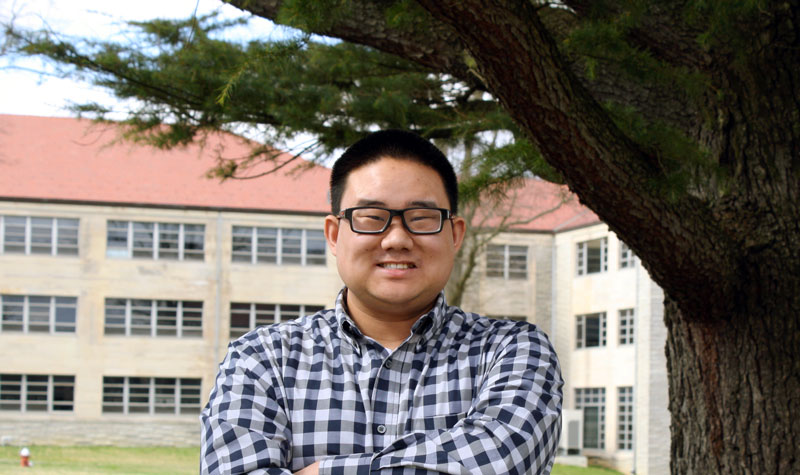Immaculata News
Adult Professional Studies Profile: Nathaniel DiDonato

Nathaniel DiDonato tells me that he honestly didn’t know what to expect from Immaculata’s Emergency Planning and Management (EPM) program. Having been enrolled at another college that suddenly dropped their EPM program, DiDonato scrambled to find another institution that offered the same major.
“One of the things that I like about Immaculata’s EPM program is that it is accredited by FEMA,” DiDonato shares. “That is something that I really wanted, in the event that I go the federal government route down the road.”
Right now, with a degree in EPM and a minor in cybersecurity, DiDonato has plenty of career options. As the first student to graduate with credentials in cybersecurity from our program, DiDonato appreciates his academic advisor, Ruth Lambert, suggesting cybersecurity as a complement to his EPM major.
“That was one that I really didn’t know what to expect – at all,” he informs me. However, it didn’t take him long before he realized that there were lots of similarities between the two programs. “There were a lot of areas where they crossed over,” DiDonato notes.
I never realized that becoming a professional firefighter was so competitive. According to DiDonato, if you desire to be a career firefighter, a degree is definitely beneficial. Currently serving as a volunteer firefighter at Worcester Volunteer Fire Department in Montgomery County, DiDonato is considering a career in firefighting where he could possibly move up to battalion chief or transition into a full-time position within the emergency management field.
The courses that he took for EPM were extremely valuable to his development in the field and provided necessary experience. For the final project in his Risk Analysis and Threat Assessment class, DiDonato conducted a risk analysis of threats that hypothetically could occur at the King of Prussia Mall. The analysis included ways to prevent threats, including adding security cameras and traffic barriers, and creating evacuation procedures, among other suggestions. However, as we all know, emergencies, including crime, can happen anywhere.
If you want to catch criminals, you need to think like a criminal, and that’s what DiDonato did in his 3D Computing class for his Cybersecurity minor. DiDonato admits that it was a tough class, but the payoff was worth it. During the class, he enjoyed creating 3D characters, making them walk, jump and turn. However fun these activities were, they had a much larger purpose in the development of a cybersecurity professional.
“You’re trying to understand how these cybercriminals and cyberterrorists go about planning their attacks and the strategies that they use,” DiDonato explains.
For those who feel that going back to college is too daunting a task, DiDonato is here to tell you it’s really not. After meeting with Lambert and George Schwartz, ’17 Ed.D., director of IU’s Professional Studies program, which houses the programs in EPM and cybersecurity, DiDonato knew that the College of Adult Professional Studies would be the best fit with his part-time job and firefighter duties. With the support of his family, friends and employer, he was ready to enroll.
DiDonato has thrived in college. This spring, he was inducted into the Order of the Sword and Shield, a national honor society dedicated to homeland security, emergency management and all protective security disciplines.
When I asked him what challenges he feels EPM professionals face, he came alive as he described how complacent some people can become. Even though DiDonato was a toddler when terrorists struck on Sept. 11, he understands that watershed moment and is amazed that Americans still think that something like that can’t happen again.
In addition to large-scale terrorist attacks and cybercrime, he also respects the awesome power of Mother Nature. Hurricanes, earthquakes, even blizzard conditions can cause emergency situations across the country. “I’m telling you, it can happen where you are, and you need to be prepared,” DiDonato stresses.
In his EPM courses, DiDonato learned about low-frequency, high-risk emergencies and high-frequency, low-risk emergencies. He explains by saying that a terrorist attack could be considered “low frequency” because the probability of an attack is low, but it comes with very high risk. On the flip side, natural disasters are considered high frequency, especially for areas of the country known for them (he uses Florida as an example). But these disasters typically come with low risk, because local authorities have been trained to handle such emergencies and are prepared to help citizens. Finding comfort in this statement, I vow not to be complacent any longer!
Even though DiDonato is uncertain where his career will take him, he knows that having a degree in EPM and cybersecurity is going to help him, and ultimately, he’ll be helping us—the calm, complacent public.